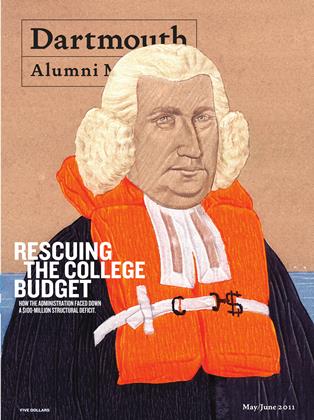The following news item on Marye Anne Fox (chem'73), written by Gary Robbins on November 17, is taken from The San Diego Union-Tribune website.
President Obama in February awarded Marye Anne Fox, the chancellor of University of California San Diego (UCSD), the country's highest science award. Obama took the National Medal of Science, which hung from a slender red, white and blue ribbon, and draped it around Fox's neck as she leaned toward the president in the East Room. The president then softly touched Fox's left elbow and used his other hand to gesture to guests, bringing ringing applause on a day when a total of 16 scholars were being honored for everything from the invention of super glue to the creation of the digital camera.
Fox beamed as she looked in the corner of the room where her husband, UCSD chemist James Whitesell, was sitting with other family members. "It was a very special moment for me personally and professionally. I was able to bring two grandchildren to see this, and it is good to know that the work you've done has hada positive impact on society."
Fox was honored for decades of research in basic chemistiy, including work that has helped improve solar energy, better reveal the nature of air pollution and advance scientists understanding of possible biological attacks by terrorists. She also helped convince Congress to invest more money on scientific research and has presided over one of the largest periods of growth in the history of UCSD.
Fox became passionate about science while growing up in Canton, Ohio. She was especially taken with chemistry. Fox remembered that period in a recent interview. "Chemistry was logical. It can be easily understood on basic principles, and those principles can be easily established in the laboratory. Biology I found messy. Physics I found too mathematical. So chemistry was like the 'Three Bears,' just right." At the time the field was dominated by men. That began to change in 1957, after the Soviet Union launched Sputnik. The American government began to more active- ly encourage women to enter the sciences, inspir- ingpeople such as Fox. She prospered during her undergraduate years, but problems arose after she enrolled at Dartmouth as a graduate student. During the interview Fox said, "I remember my second year of graduate school. I became pregnant. I had delivered a small baby. The baby needed care. I stayed home with the baby all morning and worked all night. My mentor, David Lemal, sometimes stayed with me so I wouldn't be alone, so it would be safe. My mother expected me to quit science. She said that I should stay home and raise my children. It was David Lemal who said, 'She has possibilities.' " The encouragement helped. Fox earned her doctorate and went on to become a chemist at the University of Texas. She rose to the position of vice chancellor for research. Her collective efforts in research, courting private industry and helping to set policy led to her election to the National Academy of Sciences in 1994. This elite honorific and research society was created during the Lincoln administration to advise the government on science and technology. At the time of her election fewer than 100 of its roughly 1,700 members were women. Four years later she was named chancellor of North Carolina State University, which she left in 2004 to become chancellor at UCSD.
After President Obama made a statement about the importance of restoring science to its rightful place, Fox said, "I was really pleased to see President Obama so committed to science. It's important to solving many of our economic problems."
175 Greensboro Road, Hanover, NH 03755; (603) 643-3789; m.jane.welsh.adv88@alum.dartmouth.org
 View Full Issue
View Full Issue
More From This Issue
-
 Cover Story
Cover StoryThe Cutting Edge
May | June 2011 By JULIE SLOANE ’99 -
 Feature
FeatureIn the Blink of an Eye
May | June 2011 By BRAD PARKS '96 -
 Feature
FeatureElegant Violence
May | June 2011 By MICHAEL GILLIS ’12 -
 HISTORY
HISTORYA House United
May | June 2011 By Michael Lasser ’57 -
 Interview
Interview"Nuanced Decisions"
May | June 2011 By Lisa Furlong -
 Article
ArticleNewsmakers
May | June 2011 By BONNIE BARBER
Jane Welsh
Class Notes
-
 Class Notes
Class Notes1932
May 1981 By ADRIAN A. WALSER -
 Class Notes
Class Notes1927
April 1946 By DOANE ARNOLD, HARRY B. CUMMINGS -
 Class Notes
Class Notes1919
APRIL 1986 By Edward E. Martin -
 Class Notes
Class NotesJapan
December 1975 By JOSIAH STEVENSON IV '57 -
 CLASS NOTES
CLASS NOTES2003
MAY | JUNE 2023 By Megan (Riley) Kenney -
 Class Notes
Class Notes1959
MARCH 1983 By William G. Long








